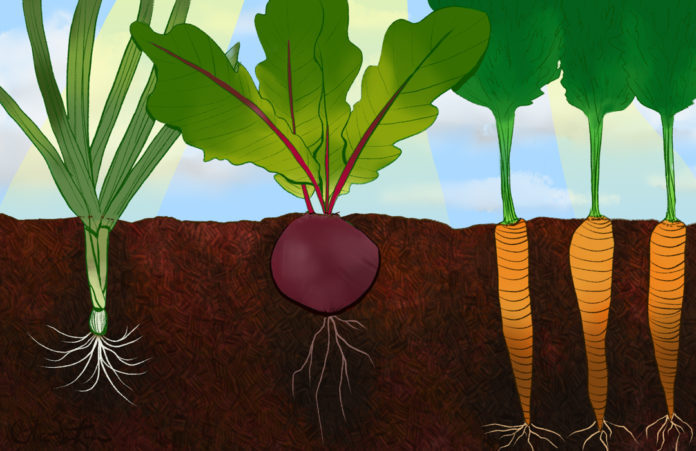When you hear the term “organic,” what do you think of? Perhaps you think that it is expensive, unnecessary, or even inaccessible to you. Perhaps you think it means that a product is healthier, less processed, or overall “better” for you. While there are benefits of non-GMO products for our health, such as consuming fewer herbicides and pesticides, I think that the benefits of organic crops go beyond human health. In fact, I believe that by supporting organic farming we can aid in improving the health of our Earth and mitigate climate change by enhancing soil fertility and eliminating chemical agriculture practices.
Surprisingly, there are distinctions between non-GMO and organic crops. Non-GMO is a term used to describe organisms that are not genetically modified and is often a marketing tool used on the “natural” or “health” products we see on grocery shelves. There are non-GMO gummy bears and potato chips, after all. Conventional crops are typically grown from genetically modified (GMO) seeds because they yield higher production rates. Both GMO and non-GMO crops, however, are less likely to be disrupted by pests than organic alternatives, due to the heavy use of synthetic fertilizers and pesticides in conventional farming. Yes, it is true that while all organic products are non-GMO, not all non-GMO products are organic. Confused? I was too.
You see, organic farmers are required to follow specific guidelines which prevent them from using synthetic fertilizers, pesticides, and municipal sewage (yes, human sewage) on their crops. However, the production of non-GMO products is only required to use non-GMO ingredients, but continues to have full access to these synthetic fertilizers and pesticides. Essentially, they can plant non-GMO seeds, spray them with pesticides and slap a “non-GMO” label on the final product and make a bigger profit off of it despite the environmental impact.
What is this environmental impact? Well, the overuse of pesticides in the agriculture industry has resulted in GMO crops being engineered for herbicide resistance. This engineering has allowed for a massive increase in the dosage of popular pesticides — such as glyphosate, the main compound in the marketed weed-killer Roundup — that is sprayed directly on crops, since those crops are heavily modified to withstand the chemical effects of this powerful pesticide. In fact, about 280 million pounds of glyphosate are used annually in conventional chemical farming which is a fifteenfold increase since GMOs were introduced on the market. That is equivalent to almost three times the weight of a Russian submarine per year! Not only is this an issue of chemical use, but this pesticide is also debated to be a human health risk and possible carcinogen. Therefore, it should go without saying that if the chemical has a link to human health, spraying large amounts of Roundup on our soils must have a huge impact on the health of our Earth.
Such large quantities of glyphosate soaking into the environment have a direct connection to the fertility and nutrient density of soil. Pesticide use has a large impact on the microflora of the soil and has an impact on the nutrient availability to seeds. With evidence to suggest that microbe health is affected by Roundup, it can be argued that we’re depleting the quality of the soil, and therefore our food, through these systemic, money-driven production decisions. On the other hand, having fertile, healthy soil creates an optimal space for soil carbon sequestration to occur. This is when carbon is taken from the air and synthesized in the soil, similar to how plants and trees help us out. In other words, healthy soil allows more carbon to be filtered and stored in our soils and plays a huge role in the global carbon cycle that aids in decreasing high levels of carbon dioxide in the air and rising atmospheric temperatures. So, yeah, soil health is a pretty big deal, and it is organic farming practices that optimize it.
Personally, I believe that consumers vote with their money. Investing in organic products isn’t simply a glorified label for healthy living; there are real global changes that can be made when you support organic farmers. The health of our soils depends on it, and in return, those soils can aid in cycling excess carbon dioxide in the environment that causes global heating and climate change. Look, I get it. Living within a budget can make it difficult to only buy organic products. I myself am not perfect, nor will I probably ever be, but I try to make a conscious effort to include organic products in my life whenever possible. This is what I believe is important for everyone to take into account and consider in your next trip to the grocery store. You can start with small steps, slowly building your way up the “organic ladder,” to take real and sustainable action to fight climate change.
Image: Danyka Van Santen/The Cascade
Sydney is a BA English major, creative writing student, who has been a content contributor for The Cascade and is now the Opinion editor. In 7th grade, she won $100 in a writing contest but hasn’t made an earning from writing since. In the meantime, she is hoping that her half-written novels will write themselves, be published, and help pay the bills.


